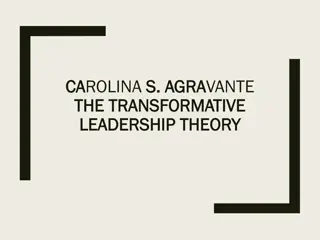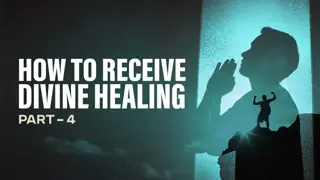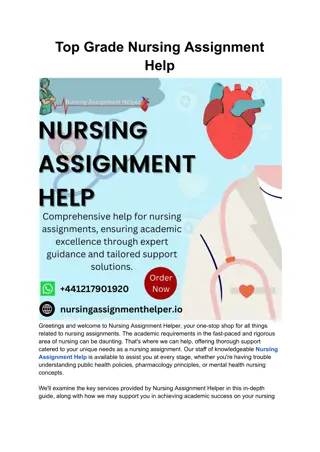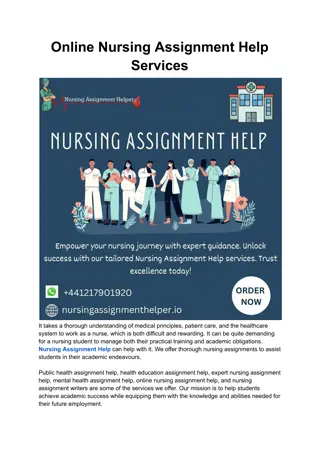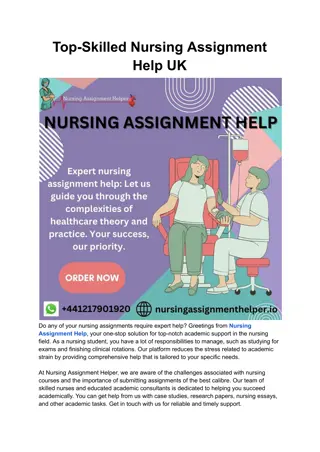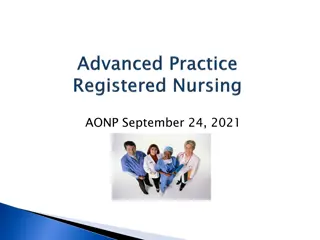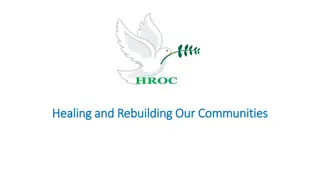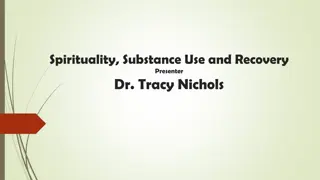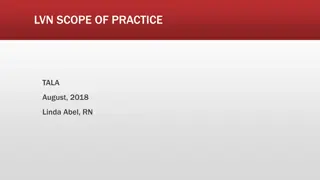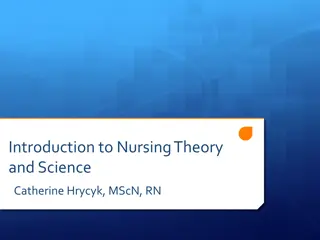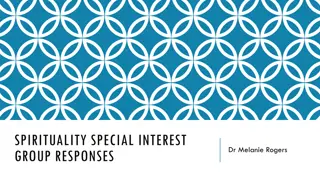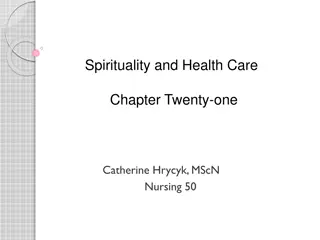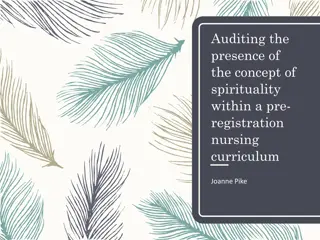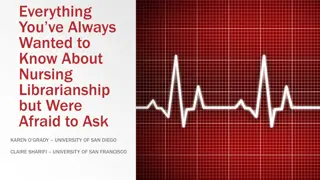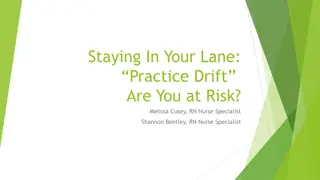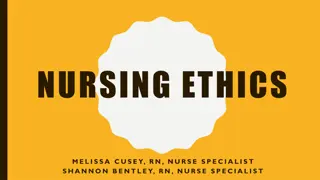Exploring Spirituality and Healing in Advanced Nursing Practice
Dive into the intersection of spirituality and healthcare, focusing on the importance of spiritual aspects in advanced nursing practice. Concepts such as spirituality, religion, interspirituality, healing, and influential nursing theories are discussed, emphasizing the significance of holistic care encompassing mental, emotional, physical, relational, cultural, and spiritual dimensions.
Download Presentation

Please find below an Image/Link to download the presentation.
The content on the website is provided AS IS for your information and personal use only. It may not be sold, licensed, or shared on other websites without obtaining consent from the author. Download presentation by click this link. If you encounter any issues during the download, it is possible that the publisher has removed the file from their server.
E N D
Presentation Transcript
Spirituality in Healthcare Focus on Advanced Nursing Practice Linnea Axman, DrPH, MSN, FNP-BC, FAANP
Do not stand at my grave and weep, I am not there, I do not sleep. I am a thousand winds that blow; I am the diamond glints on snow; I am the sunlight on ripened grain; I am the gentle autumn's rain. When you awaken in the morning's hush, I am the swift uplifting rush Of quiet birds in circled flight. I am the soft star that shines at night. Do not stand at my grave and cry. I am not there; I did not die. Anonymous
Spirituality An ontologically driven impulse toward union or relationship with God (or ultimate transcendent reality) (Barss, 2012)* A motivating force that searches for meaning and purpose in life through connectedness (Sellers, 2001) A personal search for meaning and purpose in life that brings faith, hope, peace, empowerment Definitions
Religion An expression of the spiritual relationship that unites an individual with a moral community that shares similar experiences World View Mental maps we use to explain the world around us; core beliefs and meanings that that ultimately drive our behavior Trust State of confidence in and receptivity to optimum healing Definitions
Interspirituality The sharing of ultimate experiences across traditions Healing The process of moving towards wholeness in all dimensions of health: mental, emotional, physical, relational, cultural, spiritual. May or may not be associated with curing Definitions
Nightingale (1860): Presence of a Creator in the world Rogers (1976): Choosing to actualize potentials that enhance what is perceived as beneficial interconnectedness with all life including a transcendent dimension or Being Watson (1985): Health as balance among body, mind, spirit and/or soul Spirituality and Healing in Nursing (Theory) Explored
The Science of Unitary Human Beings: Theoretical Basis for Nursing Martha Rogers
The Heart Chakra is the entryway to the spiritual. Chakras 7-5 are earth- based, in the physical realm. Chakras 3-1 are of the spiritual realm. Chakras
Neuman (1989): The 5thclient variable; spiritual development takes place throughout the lifecycle Leininger (1991): In the sunrise model , both religious and philosophical factors give meaning to a culture group and both contributing to spirituality Roy (1997): Focus on awareness, enlightenment, and faith Spirituality and Healing in Nursing (Theory) Explored
LEININGER'S THEORY OF CULTURE CARE and The Sunrise Enabler
Healing can be significantly enhanced when individuals trust in their healing process and relationships (up to 30%) Psychoneuroimmunology has validated the healing response Essential to patient safety To neglect spirituality, or to fail to assess spiritual health places individuals at risk Significance to Nursing and Healthcare
T.R.U.S.T. Model of Inclusive Spiritual Care (Barss, 2012)
Rooted in evidence Inclusive Holistic Allows spiritual matters of health to be defined by the individual Informed by world wisdom traditions Engenders trust Asserts that trust links spirituality and health Assumes nurses competence to assess, deliver, refer Assumes nurse educators competence to mentor Assists care providers to offer spiritual care T.R.U.S.T. Model of Inclusive Spiritual Care (Barss, 2012)
Not all traditions enhance ones well-being Spiritual needs may be in conflict with doctrine May be essential catalyst for coping, healing, and transformation Spiritual practices include: Prayer, mediation, sacred readings, participation in ritual, music and chanting, yoga, martial arts, hiking, walking Physical benefits include functional enhancement of the immune, cardiovascular, muskuloskeletal, and nervous systems T. is for Traditions
It works! Evidence is inconclusive It does not work! It is not possible to test the healing power of prayer through current methods of scientific enquiry Arguments and the power of Prayer
http://www.youtube.com/watch?v=PrSamB WmTSc I believe in miracles: Prayer works it really works
Do explore: any unresolved issues Self-identified need for forgiveness Do not rush or judge Do use language appropriate to the tradition: Western worldview: sin, grace Indigenous worldview: balance, harmony Eastern worldview: nonattachment, letting go R. is for Reconciliation
Essential for clients and healthcare providers to understand which beliefs are sustaining, inspiring, and health promoting and which beliefs are distressing, disempowering, and health compromising U. is for Understanding
Explore faith questions (the need to make meaning out of suffering) Challenge old beliefs and seek new ones that make sense out of the current situation Explore natal beliefs and additional traditions (interspirituality) S. is for Searching
The spiritual, religious, and personal mentors and external resources individuals trust to help them through issues that are relevant to their healing process Don t forget traditional healers Be deeply observant, humble, and utilize deep listening http://www.youtube.com/watch?v=xAp9n3y Bjyo&feature=fvwrel T. is for Teachers
Listening is a far more difficult process than most people imagine. Really to listen is to let go utterly of ourselves, to let go of all the information, all the concepts, all the ideas and all the prejudices that our heads are stuffed with. Sogyal Rinpoche Deep Listening Training: http://www.spcare.org/en/edu/events-ireland/234-deep-listening- ireland-201209.html Listening
Yes questions followed by reflective questions Refer appropriately Follow-up Document After the initial assessment
Barss, K.S. (2012). T.R.U.S.T.: An affirming model for inclusive spiritual care. Journal of Holistic Nursing, 30(1), 24-34. Hodge, D. (2006). A Template for Spiritual Assessment: A Review of the JCAHO Requirements and Guidelines for Implementation. Social Work, 51(4), 317-326. Malinski, V.M. (2002). Developing a nursing perspective on spirituality and healing. Nursing Science Quarterly, 15(4), 281-287. Tanyi, R.A. (2006). Spirituality and family nursing: spiritual assessment and interventions for families. The Author. Journal Compilation 2006, 287-294. Wojnar, D., & Molinski, V.M. (2003). Developing a nursing perspective on spirituality and healing: Questions and Answers following a letter to the editor. Nursing Science Quarterly 16(4), 297-300. References



